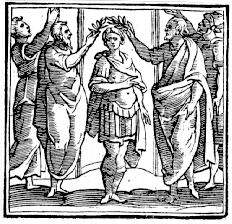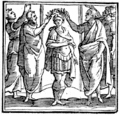Thrasybulus facts for kids
Quick facts for kids
Thrasybulus
|
|
|---|---|

Thrasybulus receiving an olive crown for his successful campaign against the Thirty Tyrants. From Andrea Alciato's Emblemata.
|
|
| Born | c. 455-441 BC |
| Died | 388 BC (aged 53-67) Aspendos (modern-day Serik, Antalya, Turkey) |
| Allegiance | Athens |
| Rank | Strategos |
| Battles/wars |
|
Thrasybulus (born around 440 BC, died 388 BC) was a famous general and leader from Athens, an ancient Greek city. He was a strong supporter of democracy, a system where people rule themselves.
In 411 BC, some powerful people tried to take over Athens and end democracy. This was called an oligarchy (rule by a few). Thrasybulus led the fight to bring democracy back. He was a key leader in several important naval battles. He also helped bring back Alcibiades, another famous Athenian, from exile.
After Athens lost the Peloponnesian War, a group called the Thirty Tyrants took control. They were harsh rulers put in place by Sparta. Thrasybulus led a small group of exiles. They fought against the Tyrants and won. This brought democracy back to Athens in 404 BC.
Later, Thrasybulus wanted Athens to be powerful again. He led Athenian forces during the Corinthian War. He was killed in 388 BC while on a military mission.
Contents
Thrasybulus: An Athenian Leader
Early Life and Beliefs
We don't know much about Thrasybulus's early life. His father was named Lycus. He was from a part of Athens called Steiria. He was likely born between 455 and 441 BC.
Thrasybulus came from a wealthy family. He served as a trierarch, which meant he paid for and commanded a warship. This showed he had a lot of money.
By 411 BC, Thrasybulus was known for supporting democracy. He believed Athens should be a strong empire. He also strongly supported the democratic ideas of Pericles. People said he was a great speaker. He was also known for being brave and bold in his plans.
Fighting for Democracy in 411 BC
In 413 BC, Athens suffered a huge defeat in Sicily. Many cities in its empire started to rebel. A Spartan fleet also sailed to help these rebels. Athens was in a very difficult situation.
During this crisis, some rich Athenians wanted to end democracy. They planned to set up an oligarchy. They also wanted to bring back Alcibiades from exile. These plotters started their plans in Samos, where the Athenian navy was based.
However, democrats in Samos found out about the plan. They told Thrasybulus and other leaders. With the help of Athenian soldiers and sailors, they stopped the plotters in Samos.
When a ship brought this news to Athens, the new oligarchic government arrested the crew. So, the army in Samos chose new generals, including Thrasybulus. They said they were still loyal to democracy. They decided to keep fighting Sparta.
One of Thrasybulus's first actions was to bring Alcibiades back. He believed Alcibiades could help Athens get support from the Persian Empire. Alcibiades was then elected as a general too. Soon after, the oligarchic government in Athens was overthrown. Democracy slowly returned.
Leading in Battle
In the months that followed, Thrasybulus commanded the Athenian fleet. He played a big part in several major victories.
At the Battle of Cynossema, he commanded the right side of the fleet. He helped prevent a defeat and led Athens to victory. Soon after, he helped win another battle at Abydos.
Thrasybulus was also a commander at the Battle of Cyzicus. This was a huge victory for Athens. The Athenians tricked the Spartan fleet into chasing a small force led by Alcibiades. When the Spartans were far from shore, Thrasybulus and Theramenes appeared behind them. They cut off the Spartans' escape. The Spartans tried to flee to a beach. Thrasybulus landed his own forces to help Alcibiades. The Spartans and Persians were defeated. The Athenians captured all the Spartan ships.
In 409 and 408 BC, Thrasybulus continued to lead. He worked to regain cities for Athens in Thrace. He also helped bring back tribute (payments) from these areas. In 407 BC, he was part of a fleet trying to capture Phocaea. But the Spartans won a battle at Notium, which led to Alcibiades being exiled again. Thrasybulus was also removed from command.
However, Thrasybulus returned to action at the Battle of Arginusae in 406 BC. He was a trierarch in the fleet sent to help another general, Conon. Athens won this battle. After the battle, Thrasybulus and Theramenes were left to rescue survivors. A sudden storm hit, and many Athenians drowned. This led to a big scandal in Athens. The generals were blamed and executed. Thrasybulus was not involved in this debate.
Overthrowing the Thirty Tyrants
In 404 BC, Athens lost the Peloponnesian War. Sparta forced Athens to accept a harsh government called the Thirty Tyrants. This group took away many citizens' rights. They also executed many people. Even a moderate leader named Theramenes was killed. Many Athenians fled to Thebes to escape.
Thrasybulus was one of the first to oppose the Tyrants. He was exiled to Thebes. In 403 BC, he led about 70 exiles to seize Phyle, a strong position near Athens. A storm stopped the Tyrants from attacking him right away. Many more exiles joined him.
When Spartan soldiers and Athenian cavalry came to fight him, Thrasybulus launched a surprise attack at dawn. He killed many Spartans and made the rest flee.
Five days later, Thrasybulus led his growing force to Piraeus, the port of Athens. He fortified a hill there. The forces of the Thirty Tyrants attacked him. Thrasybulus's men were outnumbered, but they had a better position. They defeated the oligarchs, and their leader, Critias, was killed.
After this victory, the remaining Tyrants fled. The oligarchs in Athens started fighting among themselves. They asked Sparta for help. Sparta sent Pausanias, a more moderate leader. Pausanias's forces defeated Thrasybulus's men, but it was a tough fight. Pausanias then helped arrange a peace deal. Democracy was restored in Athens.
Thrasybulus helped pass a law that pardoned most of the oligarchs. This prevented more fighting and helped Athens unite. For his actions, Thrasybulus was given an olive crown by his people.
Later Years and Legacy
After democracy returned, Thrasybulus became an important leader. He wanted to bring back pay for political service. He also wanted to give citizenship to foreigners who had fought with him.
When the Corinthian War began, Thrasybulus pushed for Athens to take strong action. He helped rebuild the Long Walls, which had been destroyed. He also commanded Athenian forces in battles like Nemea and Coronea. These defeats hurt his standing. Another general, Conon, became more prominent.
In 392 BC, Conon was captured. Thrasybulus then regained his leading role. In 389 BC, he led a fleet to collect tribute from cities around the Aegean Sea. He helped rebuild Athens' influence. He captured Byzantium and collected money from many islands.
In 388 BC, while leading his fleet, his soldiers damaged farms in Aspendus. In revenge, the people of Aspendus attacked the Athenian camp at night. Thrasybulus was killed in his tent.
Thrasybulus was a skilled military leader, especially in naval battles. He was also a good speaker. He always defended democracy in Athens. He risked his life to fight the Thirty Tyrants. His actions helped bring democracy back quickly.
Historians praise Thrasybulus for his role in restoring democracy. He helped Athens become stable again after a period of civil war. Athens remained a democracy for a long time after his efforts.
The ancient writer Pausanias called Thrasybulus "the greatest of all famous Athenians." This shows how highly he was thought of for overthrowing the Thirty Tyrants and his other achievements.
Thrasybulus was a true Athenian patriot. He believed strongly in democracy. He died fighting for the same cause he had supported throughout his life.
Images for kids
See also
 In Spanish: Trasíbulo para niños
In Spanish: Trasíbulo para niños
 | Jessica Watkins |
 | Robert Henry Lawrence Jr. |
 | Mae Jemison |
 | Sian Proctor |
 | Guion Bluford |




